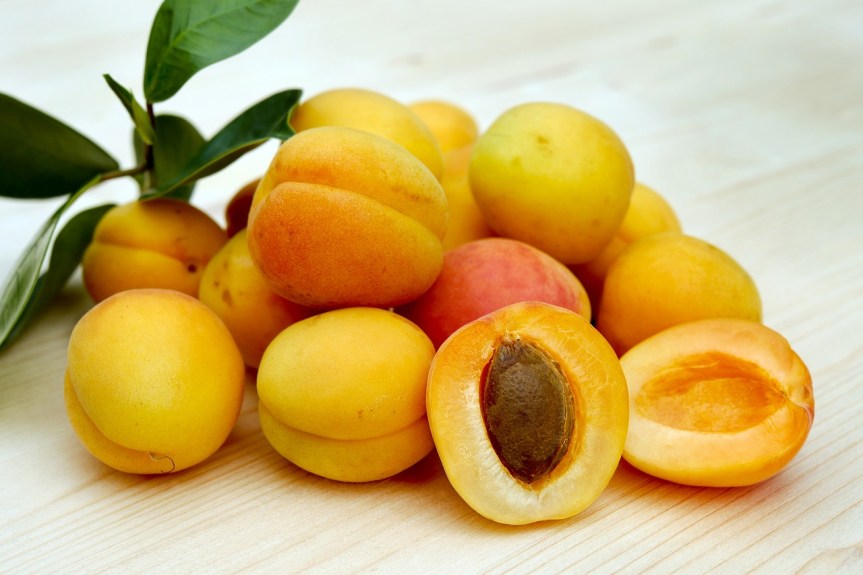Apricots (Prunus Armeniaca) are small, yellow-orange, tart-tasting fruits with a stone in the middle. They are a great source of many antioxidants, including vitamins A and C, as well as dietary fiber. The scientific name of this fruit was derived from Armenia, because most people think that it originated there.
You can enjoy apricots either fresh or dried. Their petite size makes them great for snacking, while the dried version is great for throwing in a trail mix for a fiber boost on the go. Like most fruits, they make a great addition to a healthful diet.
This article lists five health benefits of apricots, takes a look at their nutritional value, and suggests a few ways in which you can add the fruit to your diet.
Health Benefits of Apricots
1. Nutrient Dense
Apricots are very nutritious and contain a lot of essential vitamins and minerals. Just 2 fresh apricots (70 grams) contain:
- Calories: 34
- Carbohydrates: 8 grams
- Protein: 1 gram
- Fat: 0.27 grams
- Fiber: 1.5 grams
- Vitamin A: 8% of the DailyValue (DV)
- Vitamin C: 8% of the DV
- Vitamin E: 4% of the DV
- Potassium: 4% of the DV
Apricots also contain many antioxidants like beta-carotene, lutein, and zeaxanthin, which reduce inflammation and fight free radicals in the body. A large number of nutrients and fiber are present in the skin of apricots. To enjoy all of these nutrients, eat this fruit whole and unpeeled.
2. Rich Source of Fiber
Apricots contain a large amount of fiber, both soluble and insoluble fiber. Soluble fiber can dissolve in water. It helps in reducing blood cholesterol, and can reduce the risk of heart diseases. Soluble fiber also keeps blood sugar in control, and it feeds your beneficial gut bacteria. A healthier gut microbiome is linked to a lower risk of obesity and an improved immune system.
Insoluble fiber cannot be dissolved into the water and is present in the skin of the fruits. Insoluble fiber has the ability to regulate bowel movement. This fiber also helps in keeping you full for longer and aids weight loss.
3. High in Health-Promoting Antioxidants
Apricots not only contain minerals and vitamins, but they are also a great source of some antioxidants like beta-carotene and flavonoids, like chlorogenic acid, catechins, and quercetin.
These compounds work to neutralize free radicals, which are harmful compounds that damage your cells and cause oxidative stress. Oxidative stress is linked to obesity and many chronic diseases, such as heart disease.
4. Improve Skin Health:
Apricots can also provide benefits to the skin. Antioxidants, like vitamins C and E in apricots, are known for their skin-boosting properties. They can help to protect skin cells from ultraviolet (UV) radiation, reduce signs of early wrinkles, and improve skin elasticity. Beta-carotene is another antioxidant that helps to protect your skin from sunburns and additional UV damage.
5. Improve Eye Health:
Apricot contains several vitamins which are essential for eye health like vitamins A and E. Studies have shown the benefits of these two vitamins in reducing diseases linked to the eyes.
Vitamin A helps prevent night blindness, a disorder caused by the lack of light pigment in the eyes. Vitamin E protects the eye from free radical damage.
Apricots also contain the carotenoids lutein and zeaxanthin, found in the retinas and lenses of the human eye. Both lutein and zeaxanthin safeguard against oxidative stress.
Ways to Eat Apricots
Both fresh and dried apricots are not only a quick delicious addition to your snack and meals, but they can also make your diet nutritious. There are many different ways through which you can add apricots into your diet:
- Snacks: Eat apricots fresh as a snack.
- Topping: Add fresh or dried apricots slices to yogurt or cereal.
- Jams: Used fresh apricots to make jams.
- Baked Goods: Add fresh apricots into desserts, like pastries, pies, and cakes.
- Salads: Add fresh apricot slices to your favorite salad.
- Stews: Add chopped dried apricots into a stew.
- Smoothies: Use frozen apricot slices to make refreshing smoothies.
- Trail Mix: Use dried apricots as a trail mix ingredient.
Summary
Like most fruits and vegetables, apricots are a good source of many of the vitamins and minerals that our bodies need to function. Studies have proved the apricot benefits for the digestive system, eyes, and skin. Apricots can also help reduce the risk of major diseases like stroke and heart diseases due to the presence of a large amount of dietary fiber.
Apricots can be eaten fresh or dried. These can also be added to yogurt and salad to eat as a snack or can also be added to main meals as well. The benefits of apricots make them a good addition to a healthy, balanced diet.

